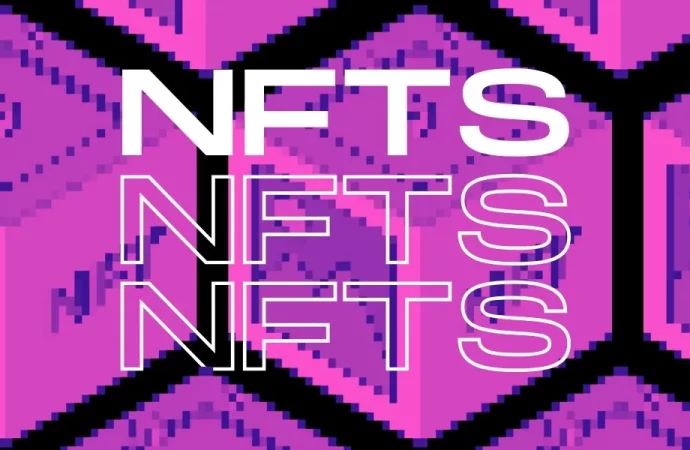Introduction: The Rise of NFTs in Entertainment Non-Fungible Tokens (NFTs) have taken the digital world by storm, quickly gaining attention for their unique capabilities in sectors such as art, gaming, and entertainment. NFTs are digital assets that represent ownership of a unique item, verified through blockchain technology. In the entertainment industry, NFTs are revolutionizing how
Introduction: The Rise of NFTs in Entertainment
Non-Fungible Tokens (NFTs) have taken the digital world by storm, quickly gaining attention for their unique capabilities in sectors such as art, gaming, and entertainment. NFTs are digital assets that represent ownership of a unique item, verified through blockchain technology. In the entertainment industry, NFTs are revolutionizing how artists, filmmakers, and musicians create, distribute, and monetize their work. This article explores the impact of NFTs on the entertainment industry, with an emphasis on how they are changing content ownership, fan engagement, and the overall business model of entertainment.
What Are NFTs and How Do They Work?
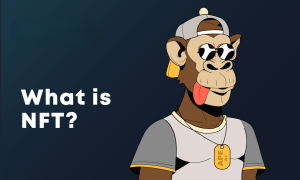
Image by: Yandex.com
NFTs, or non-fungible tokens, are digital assets that represent ownership or proof of authenticity of a unique item, whether it’s a piece of art, a song, a video clip, or even a tweet. Unlike cryptocurrencies like Bitcoin, NFTs are unique and cannot be exchanged on a one-to-one basis. They are typically stored on a blockchain, which ensures transparency, security, and proof of ownership.
This technology has been embraced by various sectors, but its effects on the entertainment industry are particularly noticeable. With NFTs, creators can tokenize their work, allowing fans to purchase and own a digital piece of their content. This could be anything from exclusive behind-the-scenes footage to rare artwork from a movie or music album.
NFTs Empowering Creators

Image by: Yandex.com
One of the most exciting aspects of NFTs is how they empower creators. Traditionally, creators in the entertainment industry relied heavily on third-party platforms, record labels, and production companies to distribute and monetize their work. These intermediaries would often take significant cuts, leaving creators with only a fraction of the revenue.
NFTs have changed this dynamic by allowing creators to directly sell their work to their audience. Musicians, filmmakers, and artists can now tokenize their creations and sell them as NFTs, often generating far more revenue than they would through traditional channels. Additionally, NFTs can be programmed with smart contracts, ensuring that creators receive royalties whenever their work is resold in the future.
NFTs and Digital Ownership: A Game-Changer for Creators
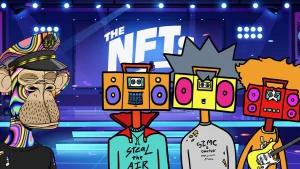
Image by: Yandex.com
NFTs have introduced a new concept of digital ownership that allows creators to maintain control over their work in ways not previously possible. Traditionally, once content such as music or films is sold or distributed online, creators lose the ability to control its future use. However, with NFTs, creators can embed smart contracts into their work. This allows for royalties to be automatically paid every time the NFT is sold, ensuring that creators receive continuous income from their intellectual property.
Example: A music artist can sell a song as an NFT, and every time that NFT changes hands, the artist earns a percentage of the resale price.
Fan Engagement: Building Stronger Communities with NFTs

Image by: Yandex.com
In addition to providing financial benefits, NFTs offer unique opportunities for fan engagement. Fans can now own exclusive content like limited edition albums, behind-the-scenes videos, or unique virtual experiences. This creates a more interactive and personal relationship between entertainers and their fans.
Example: Musicians or movie producers can sell exclusive access to content through NFTs, allowing fans to feel a part of an inner circle.
Moreover, NFTs allow for collectibles in the digital space. Fans of films, games, or music can now own digital versions of items they love, such as movie props, autographs, or iconic music moments.
The Impact on Revenue Models in Entertainment
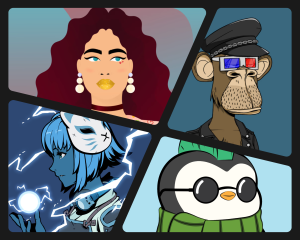
Image by: Yandex.com
NFTs are redefining the revenue models in the entertainment industry. Traditional revenue streams, such as ticket sales, merchandise, and digital downloads, are being supplemented—or in some cases, replaced—by NFT sales. The decentralized nature of blockchain allows creators to bypass intermediaries such as record labels, studios, or publishers, keeping more of the profits for themselves.
Example: Independent filmmakers can now crowdfund their projects through NFT sales, selling exclusive rights or behind-the-scenes content directly to fans, removing the need for a production studio.
This shift is empowering for smaller creators who may not have access to major distribution networks, giving them direct channels to their audience.
Challenges and Criticism: Environmental Concerns and Speculation

Image by: Yandex.com
While NFTs bring many advantages, they also face criticism. One major issue is the environmental impact of the blockchain technology behind NFTs. Blockchain networks like Ethereum require significant energy to process transactions, leading to concerns about sustainability.
Additionally, there’s speculation in the NFT market. Some believe that NFTs are in a bubble, with prices of digital assets sometimes skyrocketing without clear long-term value. This can lead to inflated prices for NFTs that may not retain their value over time.
NFTs in Film and Television
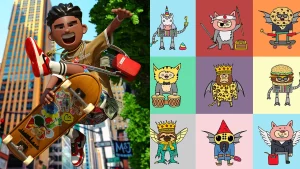
Image by: Yandex.com
The film and television industries are also embracing NFTs. Studios are exploring the idea of releasing exclusive movie clips, behind-the-scenes footage, or even entire films as NFTs. Independent filmmakers, in particular, are finding NFTs to be a new funding source, allowing them to pre-sell content to their most loyal fans.
Example: Filmmakers are using NFTs to raise money for film projects by selling digital assets such as exclusive trailers or rare movie posters as NFTs. This not only generates revenue but also creates a sense of ownership among fans.
NFTs in the Music Industry

Image by: Yandex.com
The music industry has perhaps embraced NFTs the most. Artists can tokenize their work, releasing exclusive songs, concert tickets, or virtual meet-and-greets through NFTs. This direct-to-fan model allows musicians to create new revenue streams and maintain a closer connection to their fanbase.
Example: Kings of Leon became the first band to release an album as an NFT, offering exclusive perks such as limited-edition vinyl records and front-row concert tickets to fans who purchased the album’s NFT version.
Risks and Challenges of NFTs in Entertainment
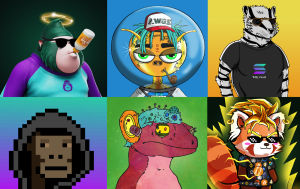
Image by: Yandex.com
Despite the potential benefits, there are risks and challenges associated with NFTs in the entertainment industry. The environmental impact of blockchain technology is a growing concern. Many NFTs are built on the Ethereum blockchain, which consumes a significant amount of energy. This has led to criticism from environmental activists and raised questions about the sustainability of NFTs.
Moreover, the volatility of the NFT market is another challenge. The value of NFTs can fluctuate dramatically, leading to concerns about whether they are a stable investment. For creators, there is also the risk of oversaturating the market, which could lead to reduced demand for NFTs in the long run.
Finally, the legal implications of NFTs are still evolving. As a relatively new technology, there are questions about intellectual property rights, ownership, and copyright issues related to NFTs. Creators and buyers alike must be cautious and ensure they fully understand the legal ramifications of engaging with NFTs.
The Future of NFTs in Entertainment
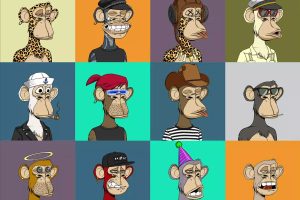
Image by: Yandex.com
As NFTs continue to evolve, they will likely become a mainstay in the entertainment industry. Whether it’s through offering exclusive digital content, building stronger fan connections, or enabling creators to control their work, NFTs are changing how entertainment is created, consumed, and valued.
With advancements in blockchain technology and efforts to address environmental concerns, the future of NFTs looks promising. As more creators experiment with this technology, the potential uses for NFTs in entertainment are likely to expand, offering even more opportunities for innovation.
Analysis Table: Benefits and Challenges of NFTs in Entertainment
| Benefits | Challenges |
|---|---|
| New revenue streams for creators | Environmental concerns |
| Greater fan engagement opportunities | Market speculation and volatility |
| Decentralized control for creators | Complex for general audiences |
| Royalties embedded in smart contracts | Legal and copyright issues |
| Opportunities for smaller creators | High entry costs for artists |
Comparative Table: Traditional Entertainment Models vs. NFTs
| Aspect | Traditional Models | NFT Models |
|---|---|---|
| Content Ownership | Controlled by studios and labels | Controlled by creators through blockchain |
| Revenue Distribution | Revenue shared with intermediaries | Direct revenue to creators |
| Fan Engagement | Limited (e.g., concerts, merchandise) | High engagement through exclusive NFTs |
| Resale Value | No creator earnings from resales | Creators earn royalties from resales |
| Access to Opportunities | Limited by industry gatekeepers | Open access to fans and creators |
Conclusion
NFTs are revolutionizing the entertainment industry by offering new ways to create, distribute, and monetize content. With the ability to control digital ownership, generate ongoing royalties, and engage fans on a deeper level, NFTs represent an exciting shift in the way entertainment is experienced. While challenges like environmental concerns and market speculation exist, the potential for NFTs to reshape the entertainment landscape is undeniable.

